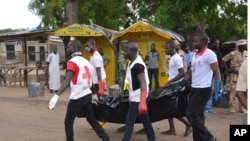Officials of the International Committee of the Red Cross held a training session for army doctors in Zimbabwe this week on what to do if and when they come under attack.
Training of the 18 military health officials, all of whose home countries are members of the Southern African Development Community (SADC), had the theme of “Increasing Access to Health Care in Peace Support Operations.”
The SADC region is generally peaceful these days, but has known conflict in the recent past, especially in Angola and the Democratic Republic of Congo, and political unrest in Zimbabwe.
Jacques Lemay, who heads ICRC’s armed forces delegation in SADC, says research shows that 90 percent of those affected by attacks on medical facilities during armed conflict or other emergencies are local health workers.
"So therefore, the ICRC decided to launch a project of health care in danger in order to raise awareness among those who take part in these armed conflicts or peacekeeping operations, missions where [there is] awareness of the challenge in getting access to these health care for the population," he said. "In the last two years we are talking in the order of over 2,000 incidents [worldwide]."
He said these attacks prevent civilians and others who are entitled to medical care from receiving it.
According to Brigadier-General Kaka Mudambo, who heads the SADC Military Health Services Committee, medics and medical facilities are targeted in a warfare for a specific reason.
"Medical supplies, medical equipment are very valuable," he said. "People would want to make money out of them. And some people would want to deny opponents the access to those medicines. The attacks are ongoing, they happen everywhere. And this then denies not only the armed people but also the general population of the medical care that is needed."
ICRC officials would not disclose the specific techniques being taught in the three-day course, except that participants are instructed not to be aggressive when they come under attack.
The goal, they said, is improved protection of essential medical services during conflicts and peacekeeping operations.







